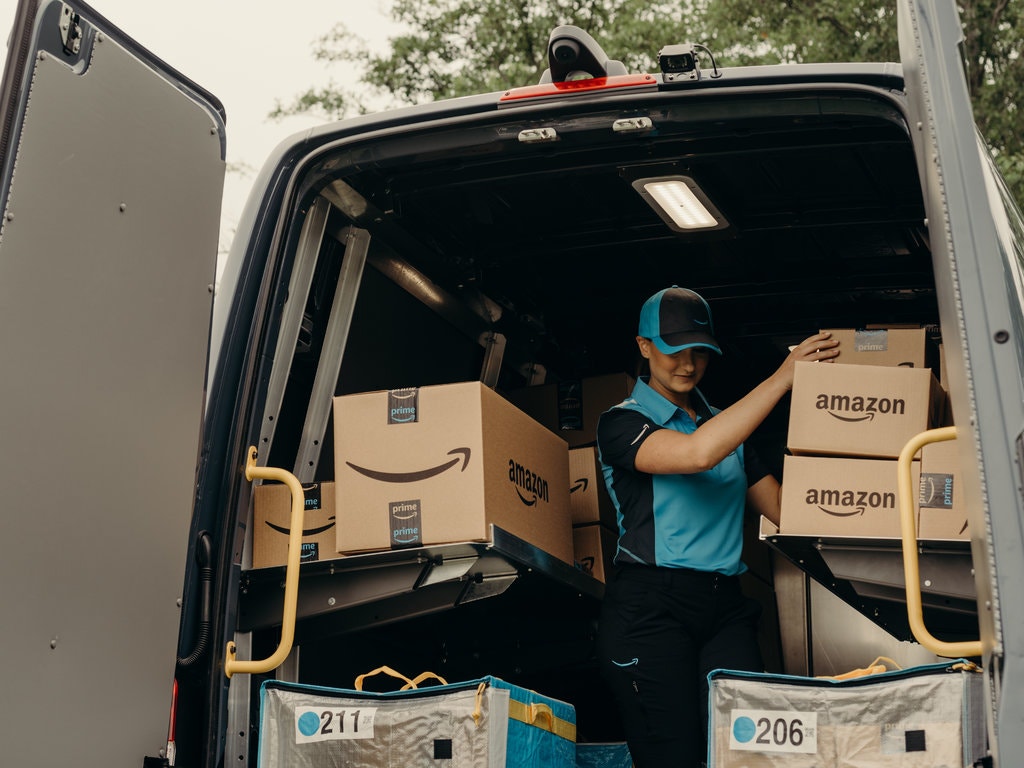Last Thursday, Amazon CEO Jeff Bezos announced in the company’s first-quarter earnings report that shareowners “may want to take a seat.” He wasn’t preparing them for sticker shock from the quarter’s losses — around $622 million, chalked up to the cost of rapidly expanding to meet demand — but for the massive investment he planned for the second quarter. As the e-commerce giant becomes a lifeline for Americans stuck at home during the pandemic, Bezos vowed to invest Amazon’s anticipated $4 billion second-quarter profit into adapting to the demands of the coronavirus, including buying PPE for its employees and developing its own testing capacity.
Last Friday, the House Judiciary Committee gave Amazon shareholders a reason to take a seat in front of a C-Span stream when seven bipartisan members called for Bezos to testify regarding a Wall Street Journal report that the company used data from independent sellers to design its own products to meet consumer demand. On Tuesday’s episode of the New York podcast Pivot, co-hosts Kara Swisher and Scott Galloway discuss the recent developments, examining how Amazon’s investment could consolidate their vice grip on the post-coronavirus economy and how Bezos might fare in front of Adam Schiff. They also talk with Anand Giridharadas about how the COVID-19 crisis is an opportunity to reinvent government.
Amazon Is Lapping the Competition
Kara Swisher: So with this $4 billion investment, Bezos is going to pull ahead of everybody by laps around the track. Tell me what you think?
Scott Galloway: This is the most underreported business story of last week. Bezos effectively said, “We’re taking all of our profits and we’re piling it back into growth,” or specifically in initiative, which is protective gear, testing, protocols, and additional compensation. I’ll be curious how that actually translates to additional compensation, to respond to a post-COVID world. And I just sat there, and it sunk in on me — what is going on here? It is so mind-blowing and ambitious, no doubt about it. This guy is the visionary of our age when it comes to business.
Amazon is going to build and construct through an investment an expertise that no one else can match. They’re going to build the first vaccinated supply chain globally. That is, if you’re a vendor, if you’re a worker, if you’re a customer, anything that goes through their supply chain is not only not interrupted but is virus-free. He’s going to be able to say, “Okay, there’s every other supply chain globally, and then there’s the Amazon supply chain.”
And also, making a serious investment in testing what is about to become the biggest consumer product category in the world, testing for the novel coronavirus. And Amazon may be the best at it and have the supply chain to deliver it. I mean, it’s just —Get unlimited access to Intelligencer and everything else New YorkLEARN MORE »
Swisher: No one can beat him on delivery, no one can beat him on convenience. Price, he keeps up. He doesn’t, like, win necessarily, but he keeps up on price. He keeps up on what you want, the anticipation, more and more technology around it.
Galloway: Well, so he says this, and of course shareholders are like, “Oh shit, they’re not going to be profitable again.” And they took the stock down 7 percent. This is the scale of Amazon. Whenever I speak to elected officials, I don’t make new arguments; all I really do is show them the scale of what we’re talking about. So Amazon, because they said they’re reinvesting their profits, what happens is, until the marketplace absorbs the fact that they’re about to, as you say, lap the competition again, they get angry and they whack the stock for about 24 or 48 hours. You watch, the stock is going to recover and more this week.
But when their stock goes down 7 percent, that’s like losing the value of Boeing. That’s where Amazon is right now; it gains or loses the value of Boeing in a single trading day. So when you’re talking about a company that’s quote-unquote too big, just remember, it can shed or gain Boeing in a trading day. And that’s what happened. He is unafraid to lose the value of Boeing. This is not how most CEOs think. And Wall Street doesn’t care. They just trust him now because they let him do it for so long before. So they’re used to it. Like Apple cannot do this, nobody else can do this. He’s going to have the best supply chain ever.
Swisher: Well, it’s his playbook.
Galloway: It’s going to be so exciting. It’s going to be so exciting when we break their ass up into —
Swisher: And speaking of which, he’s going to go to Congress. I’d show up if I were him, I would show up.
Galloway: Why wouldn’t he? About half, about 48 percent to 51 precent of the people, are just going to talk about what a leader he is and basically glom all over him. It’s not going to be that bad for him. It’s not going to be that bad.
Swisher: Yeah. I mean, it’s about these intentionally misleading statements about using data to help themselves versus sellers on the platform. It’s a little bit dicey. Maybe he shouldn’t come. I don’t know, there’s a whole bunch of people who advise people on that, and I never understand their arguments. But I guess it’s probably not good. You could end up with like a Jerry Yang situation when you show up at Congress where —
Galloway: I don’t know, I think it’ll be more reminiscent of Howard Hughes in front of the Congress. When Howard Hughes went in front of Congress, he was basically very strong. He was one of the most famous interesting businesspeople of the age. I think Bezos would do just fine in front of Congress. I also think he’d have a lot of supporters there. I think a lot of people would basically just tee him up with softballs.
Swisher: Well, it’s interesting because some of this coronavirus legislation is helping him, like Republicans’ proposed liability legislation designed to limit companies from legal exposure as they reopen — that will help him. At the same time, you’ve got Trump after him and the Washington Post —
Galloway: I disagree there. I think actually it would hurt him because I think he will be able to avoid that liability. He’ll be one of the few companies that will actually be able to avoid that liability. And he has the money to support it and say to every worker, “I’m insuring you. I’m giving additional compensation.”
I used to go on weekends, so my dad would come pick me up after being at my mom’s, but we used to go to race go-karts, which was wildly dangerous. And we would sign this thing saying, “Okay, if you die in a fiery ball, it’s your fault.” And he’s basically going to say to the entire supply chain, “You’re taking a risk. Here’s some additional compensation, but there’s less risk here than anywhere else in the world.” It’s going to get people their sausage and their Nespresso pods.
I’m just like, I am blown away by this. I’m totally blown away by Amazon’s crazy vision and march toward $2 trillion. And it’s more important than ever that we break them up.
Swisher: This move announced last week is exactly what he should have done: leaning in with this $4 billion. Damn the torpedoes; full speed ahead. And I think at the same time, he’s got to deliver on the safety of workers. I think it’s unconscionable that someone of that wealth doesn’t have — isn’t the most concerned. And they’ve had a history of this, they’ve had a history of stories about their treatment of workers, and he needs to fix this one most of all, I think.
Galloway: They kind of upped the ante. They raised their minimum wage to $15, which I think the federal government should have done. I mean, you have companies now that have a trillion-dollar market cap, which almost all the big tech firms do. And if they want to double their market capitalization in the next five years — which they have to implicitly guarantee to their shareholders — that means that a company like Amazon needs to increase its top-line revenue by about a $100 billion over the next five years. Which is effectively adding $1.5 billion in top-line revenue every 30 days, or $50 million in incremental revenue every 24 hours, or $75 million every business day.
I mean, the scale here is staggering. And if you have to do that, it limits the sectors you can go after, so what you’re going to have is the following: Amazon is about to go into government, Amazon is about to go into defense. Apple is about to go into education. Amazon is about to go into health care, because there’s only a handful of industries that are big enough to sate the appetite of the world’s largest vampires. They can’t eat rats; they have to go after elephants.
But seriously, what’s so genius about this is that Jeff Bezos has said, “Okay, we have to get into government, we have to get into health care because there are just very few corpses big enough for us to drain enough blood to feed our insatiable appetite, here.” And they’ve effectively said, “Okay, the next-biggest consumer category in the world is going to be testing for COVID-19.”
Swisher: We talked about this — they should run the testing. It would have worked. We’d all been a lot better off if they had gotten involved.
Galloway: The people I work with are ordering their lunch from Amazon Now, which they get in 48 minutes. What if they said, “In 48 minutes, we can get you a test for either antibodies or the virus?” Available to Prime members: The Marvelous Mrs. Maisel and COVID-19 antibody tests.
Via Intelligencer

